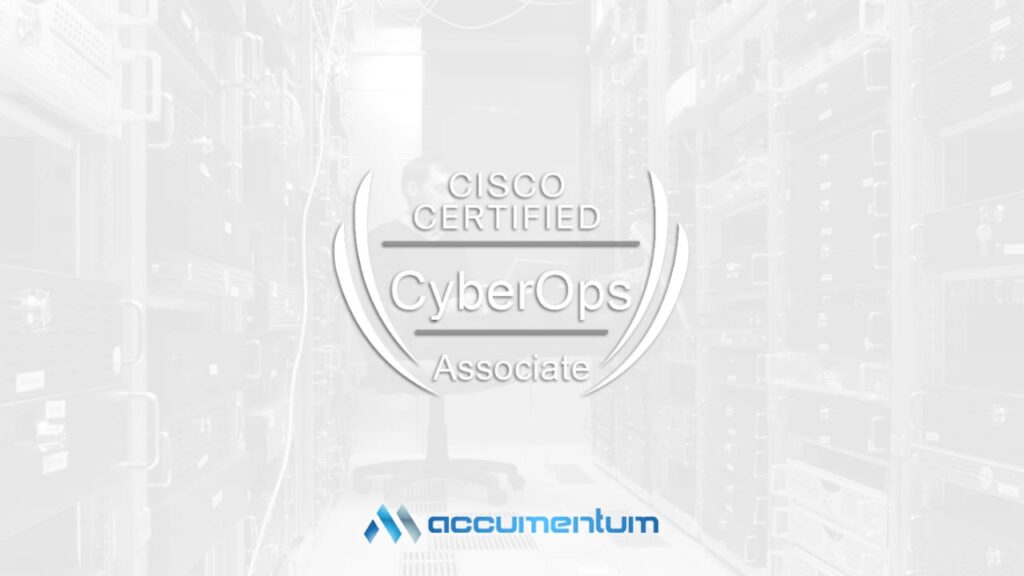Cisco CyberOps Certification Training Course
Course Overview
The Cisco Certified CyberOps Associate Certification Training Course with Accumentum is tailored for individuals looking to kickstart or enhance their career in cybersecurity operations. This course dives deep into the fundamentals of cybersecurity, focusing on security concepts, technologies, policies, and procedures essential for monitoring, detecting, and responding to security incidents. Participants will gain hands-on experience through practical labs that cover threat intelligence, endpoint protection, network intrusion analysis, and incident response techniques. This training prepares you for the Cisco Certified CyberOps Associate exam, CBROPS (Understanding Cisco Cybersecurity Operations Fundamentals), providing you with the skills needed to operate effectively in a Security Operations Center (SOC) and manage the initial phases of cybersecurity incidents.

Course Objectives
- Understand the basics of security threats, vulnerabilities, attack methods, and defense strategies.
- Learn the methodologies to detect, analyze, and respond to security incidents effectively, using industry-standard tools.
- Develop skills in collecting, analyzing, and leveraging threat intelligence to preemptively secure environments.
- Prepare to work in a Security Operations Center by mastering monitoring, investigation, and escalation procedures for cybersecurity events.
Who Should Attend
- Individuals starting their career in cybersecurity who want to build foundational knowledge and skills.
- Network administrators or technicians looking to specialize in cybersecurity roles within a SOC.
- Those pursuing or recently completing degrees in IT or cybersecurity, aiming for practical, industry-recognized certification.
- Current professionals in junior security roles seeking to validate and expand their knowledge in cybersecurity operations.
Prerequisites
- Understanding of network fundamentals, including TCP/IP, common protocols, and network architecture.
- General knowledge of operating systems, applications, and basic security concepts.
- A keen interest or some background in cybersecurity, even if at a beginner level.
- Ability to analyze data, think critically, and solve problems, which are crucial for incident response and threat analysis.
Course Content
- Understanding the CIA triad: Confidentiality, Integrity, and Availability.
- Exploring common security threats and attack vectors.
- Introduction to security policies, standards, and best practices.
- Basics of cryptography and its application in cybersecurity.
- Fundamentals of Security Information and Event Management (SIEM).
- Configuring and using log management tools for security analytics.
- Network traffic analysis with tools like Wireshark.
- Real-time monitoring for suspicious activities.
- Introduction to endpoint security and protection strategies.
- Analyzing file system, memory, and process anomalies.
- Understanding and responding to host-based alerts.
- Use of antivirus and anti-malware solutions.
- Identifying and interpreting network-based attacks.
- Techniques for packet capture and analysis.
- Understanding common protocol anomalies and their implications.
- Signature-based versus anomaly-based detection.
- Development and implementation of security policies.
- Incident response plans and procedures.
- Compliance with legal and regulatory requirements.
- Role of documentation in security operations.
- Techniques for data correlation and analysis in security contexts.
- Using threat intelligence to enrich event data.
- Creating actionable insights from security data.
- Fundamentals of data visualization for security analysts.
- Phases of incident response: preparation, identification, containment, eradication, recovery, and lessons learned.
- Handling and reporting security incidents.
- Forensics basics for incident investigation.
- Post-incident activities to prevent recurrence.
- Sources and types of threat intelligence.
- Techniques for threat hunting.
- Integrating threat intelligence into security operations.
- Understanding the kill chain and attack lifecycle.
- Processes for vulnerability assessment and scanning.
- Prioritization of vulnerabilities based on risk.
- Patch management strategies.
- Understanding and mitigating zero-day vulnerabilities.
- Structure and roles within a Security Operations Center.
- Daily operations, including monitoring, analysis, and response.
- Escalation procedures for critical incidents.
- Communication and collaboration in a SOC environment.
Course Features
Interactive Learning
Participate in training sessions, discussions, and hands-on labs with experienced instructors
Comprehensive Study Materials
Access extensive resources, including e-books, video lectures, and practice exams.
Practical Scenarios
Engage in real-world exercises and case studies to apply cybersecurity concepts.
Certification Preparation
Receive guidance and tips to successfully pass the Cisco CyberOps certification exams.
Certification Exam
Upon completing the course, you will be fully prepared to take the Cisco Certified CyberOps Associate Certification Exam. Earning this certification validates your expertise in cybersecurity operations, incident response, threat intelligence, and security monitoring, demonstrating your ability to operate effectively within a Security Operations Center (SOC) using Cisco technologies. This achievement will significantly boost your career prospects in cybersecurity analysis, incident response, and security operations roles.
Enrollment
Join the Cisco Certified CyberOps Associate Certification Training Course at Accumentum to kickstart your journey toward becoming a certified cybersecurity professional. For more details and to enroll, visit Accumentum’s registration page linked below.
